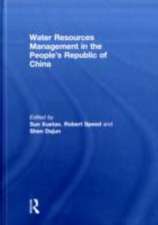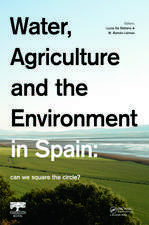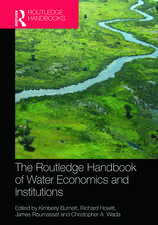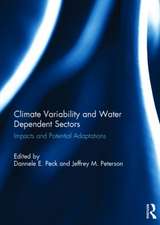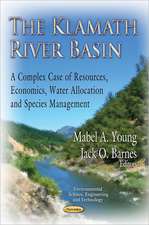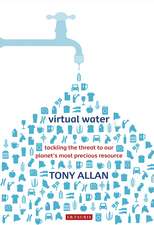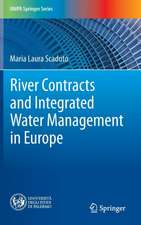Negotiating for Water Resources: Bridging Transboundary River Basins: Earthscan Studies in Water Resource Management
Autor Andrea Haefneren Limba Engleză Paperback – 27 iul 2018
Negotiating for Water Resources explores the drivers of conflict and cooperation between states in transnational river basins. Drawing on extensive fieldwork and interviews on the Mekong, Danube and La Plata River Basins, the book provides a three level analysis across three case studies, including the regional framework (EU, ASEAN and Mercosur), the River Basin Organisations (ICPDR, MRC and CIC) and the micro-level. The key question of the book is: To what extent do power asymmetries prevent or inhibit cooperation between riparian states over water resources? This is linked to the question of how institutions contribute to mitigate competition for natural resources and how states interact in a multilateral arena. Overall, the book argues that cooperation in transboundary river basins is possible even where there are asymmetric power relations, challenging realist assumptions about competition and conflict over resources.
| Toate formatele și edițiile | Preț | Express |
|---|---|---|
| Paperback (1) | 409.31 lei 6-8 săpt. | |
| Taylor & Francis – 27 iul 2018 | 409.31 lei 6-8 săpt. | |
| Hardback (1) | 1107.61 lei 6-8 săpt. | |
| Taylor & Francis – 26 sep 2016 | 1107.61 lei 6-8 săpt. |
Din seria Earthscan Studies in Water Resource Management
-
 Preț: 371.13 lei
Preț: 371.13 lei -
 Preț: 326.49 lei
Preț: 326.49 lei -
 Preț: 311.39 lei
Preț: 311.39 lei -
 Preț: 155.43 lei
Preț: 155.43 lei - 8%
 Preț: 389.09 lei
Preț: 389.09 lei -
 Preț: 310.12 lei
Preț: 310.12 lei -
 Preț: 256.02 lei
Preț: 256.02 lei -
 Preț: 312.20 lei
Preț: 312.20 lei -
 Preț: 279.32 lei
Preț: 279.32 lei -
 Preț: 326.26 lei
Preț: 326.26 lei -
 Preț: 470.90 lei
Preț: 470.90 lei - 18%
 Preț: 1060.25 lei
Preț: 1060.25 lei -
 Preț: 491.82 lei
Preț: 491.82 lei - 10%
 Preț: 311.38 lei
Preț: 311.38 lei - 18%
 Preț: 1000.27 lei
Preț: 1000.27 lei -
 Preț: 479.19 lei
Preț: 479.19 lei -
 Preț: 442.68 lei
Preț: 442.68 lei - 18%
 Preț: 1000.27 lei
Preț: 1000.27 lei - 18%
 Preț: 1056.32 lei
Preț: 1056.32 lei - 18%
 Preț: 1054.71 lei
Preț: 1054.71 lei - 18%
 Preț: 1064.70 lei
Preț: 1064.70 lei - 18%
 Preț: 1001.84 lei
Preț: 1001.84 lei - 18%
 Preț: 1051.55 lei
Preț: 1051.55 lei - 25%
 Preț: 767.07 lei
Preț: 767.07 lei - 18%
 Preț: 1002.80 lei
Preț: 1002.80 lei - 18%
 Preț: 1056.00 lei
Preț: 1056.00 lei -
 Preț: 469.34 lei
Preț: 469.34 lei - 18%
 Preț: 1173.90 lei
Preț: 1173.90 lei -
 Preț: 485.46 lei
Preț: 485.46 lei - 18%
 Preț: 1009.74 lei
Preț: 1009.74 lei - 26%
 Preț: 762.57 lei
Preț: 762.57 lei - 26%
 Preț: 764.20 lei
Preț: 764.20 lei - 12%
 Preț: 312.43 lei
Preț: 312.43 lei - 18%
 Preț: 730.71 lei
Preț: 730.71 lei - 12%
 Preț: 325.34 lei
Preț: 325.34 lei - 31%
 Preț: 765.36 lei
Preț: 765.36 lei -
 Preț: 416.22 lei
Preț: 416.22 lei -
 Preț: 483.49 lei
Preț: 483.49 lei - 18%
 Preț: 1001.84 lei
Preț: 1001.84 lei
Preț: 409.31 lei
Nou
Puncte Express: 614
Preț estimativ în valută:
78.32€ • 81.77$ • 64.82£
78.32€ • 81.77$ • 64.82£
Carte tipărită la comandă
Livrare economică 04-18 aprilie
Preluare comenzi: 021 569.72.76
Specificații
ISBN-13: 9780367000257
ISBN-10: 0367000253
Pagini: 212
Ilustrații: 34
Dimensiuni: 152 x 229 x 11 mm
Greutate: 0.29 kg
Ediția:1
Editura: Taylor & Francis
Colecția Routledge
Seria Earthscan Studies in Water Resource Management
Locul publicării:Oxford, United Kingdom
ISBN-10: 0367000253
Pagini: 212
Ilustrații: 34
Dimensiuni: 152 x 229 x 11 mm
Greutate: 0.29 kg
Ediția:1
Editura: Taylor & Francis
Colecția Routledge
Seria Earthscan Studies in Water Resource Management
Locul publicării:Oxford, United Kingdom
Public țintă
Postgraduate and UndergraduateCuprins
Chapter 1: Introduction
Chapter 2: Cooperation and Conflict in Transboundary River Basins – A Framework
Chapter 3: Troubled Mekong: Upstream-downstream Challenges and Current Developments
Chapter 4: Danube River: The Leading Example?
Chapter 5: La Plata River Basin: Overlapping Bilateral and Multilateral Treaties
Chapter 6: Cross Case Analysis, Findings and Lessons
Chapter 7: Conclusion
Chapter 2: Cooperation and Conflict in Transboundary River Basins – A Framework
Chapter 3: Troubled Mekong: Upstream-downstream Challenges and Current Developments
Chapter 4: Danube River: The Leading Example?
Chapter 5: La Plata River Basin: Overlapping Bilateral and Multilateral Treaties
Chapter 6: Cross Case Analysis, Findings and Lessons
Chapter 7: Conclusion
Recenzii
'More than ever management of the world’s transnational rivers pose compelling governance challenges. Through a novel cross case comparison approach, Haefner examines conflict and cooperation in three key basins — the La Plata, Mekong and Danube basins. By challenging prevailing ideas about power, this book offers fresh new insights to inform management in these basins - and others around the globe.' - Andrea Gerlak, The University of Arizona, USA
‘Delving into the practice of very different regions, Asia, Europe and South America, and backed by invaluable hyphen on-the-ground research on three of the larger river basins in the world, the author discusses the similarities of conflicts arising out of competing uses and discovers a trend of comparable efforts to overcome disputes geared towards cooperative mechanisms irrespective of their political asymmetries. Anyone dealing with transboundary water management issues will be enriched by this thoroughly documented and well written book.’ - Lilian del Castillo, University of Buenos Aires, Argentina
‘Delving into the practice of very different regions, Asia, Europe and South America, and backed by invaluable hyphen on-the-ground research on three of the larger river basins in the world, the author discusses the similarities of conflicts arising out of competing uses and discovers a trend of comparable efforts to overcome disputes geared towards cooperative mechanisms irrespective of their political asymmetries. Anyone dealing with transboundary water management issues will be enriched by this thoroughly documented and well written book.’ - Lilian del Castillo, University of Buenos Aires, Argentina
Notă biografică
Andrea Haefner is an Adjunct Research Fellow at the Griffith Asia Institute in Brisbane, Australia, where she also received her PhD. She has previously worked with international and national organisations in Asia and with the German local government. Her research focuses on non-traditional security issues focusing on environmental security and water governance.
Descriere
Haefner explores the drivers of conflict and cooperation between states in transnational river basins. She provides a three level analysis across three case studies, including the regional framework, the River Basin Organisations, and the micro-level.



